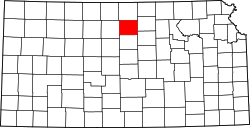Saltville, Kansas | |
|---|---|
 | |
| Coordinates: 39°17′00″N98°05′56″W / 39.28333°N 98.09889°W | |
| Country | United States |
| State | Kansas |
| County | Mitchell |
| Elevation | 1,384 ft (422 m) |
| Population | |
• Total | 0 |
| Time zone | UTC-6 (CST) |
| • Summer (DST) | UTC-5 (CDT) |
| Area code | 785 |
| GNIS ID | 481992 [1] |
Saltville is a ghost town in Salt Creek Township, Mitchell County, Kansas, United States. [1]


